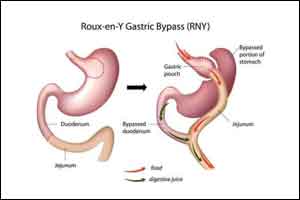- Home
- Editorial
- News
- Practice Guidelines
- Anesthesiology Guidelines
- Cancer Guidelines
- Cardiac Sciences Guidelines
- Critical Care Guidelines
- Dentistry Guidelines
- Dermatology Guidelines
- Diabetes and Endo Guidelines
- Diagnostics Guidelines
- ENT Guidelines
- Featured Practice Guidelines
- Gastroenterology Guidelines
- Geriatrics Guidelines
- Medicine Guidelines
- Nephrology Guidelines
- Neurosciences Guidelines
- Obs and Gynae Guidelines
- Ophthalmology Guidelines
- Orthopaedics Guidelines
- Paediatrics Guidelines
- Psychiatry Guidelines
- Pulmonology Guidelines
- Radiology Guidelines
- Surgery Guidelines
- Urology Guidelines
Anemia- a consequence of bariatric surgery

Researchers found a high rate of anemia 10 years after patients received Roux-en-Y gastric bypass, suggesting that long-term follow-up with a bariatric specialist is important to lessen the risk for anemia, according to a study published by JAMA Surgery.
Potential adverse outcomes of Roux-en-Y gastric bypass (RYGB), such as mineral and/or vitamin deficiency, are well documented. Dan Eisenberg, M.D., M.S., of the Palo Alto Veterans Affairs Health Care System, Palo Alto, and Stanford University, Stanford, Calif., and colleagues examined the prevalence of anemia 10 years after RYGB and assessed whether postoperative bariatric follow-up influences rates of anemia. The study included 74 patients (78 percent men; average age, 51 years) who underwent RYGB at a single Veterans Affairs Medical Center.
The average rate of preoperative anemia was 20 percent; the rate increased 10 years after RYGB to 47 percent. At 10 years after RYGB, the anemia rate in the group without bariatric specialist follow-up increased to 57 percent, from 22 percent before surgery. The rate of anemia in the group with bariatric specialist follow-up did not increase significantly after 10 years (19 percent vs 13 percent). Compared with patients with bariatric specialist follow-up, patients without bariatric specialist follow-up had significantly higher odds of anemia at 10 years after adjusting for preoperative anemia.
The major limitation of this study was the size of the group with bariatric specialist follow-up, which may be too small to identify a significant difference in the 10-year anemia rates compared with preoperative rates.
"Our study suggests that follow-up with bariatric specialists more than 5 years after surgery, rather than with specialists with no bariatric expertise, can decrease long-term anemia risk. This finding may demonstrate the bariatric specialist's specific understanding of the long-term risk for nutritional deficiency after RYGB and the importance of vitamin and mineral supplementation," the authors write.

Disclaimer: This site is primarily intended for healthcare professionals. Any content/information on this website does not replace the advice of medical and/or health professionals and should not be construed as medical/diagnostic advice/endorsement or prescription. Use of this site is subject to our terms of use, privacy policy, advertisement policy. © 2020 Minerva Medical Treatment Pvt Ltd